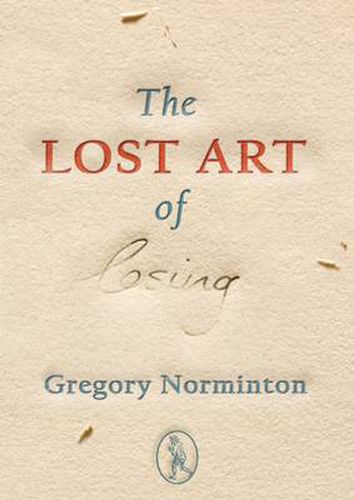Readings Newsletter
Become a Readings Member to make your shopping experience even easier.
Sign in or sign up for free!
You’re not far away from qualifying for FREE standard shipping within Australia
You’ve qualified for FREE standard shipping within Australia
The cart is loading…






Gregory Norminton transforms the aphorism into something more accessible and personal. Ultimately he uses aphorisms to question everything - including the aphorism itself: ‘Incessantly we ask the meaning of life to protect us from hearing the perfectly obvious answer.’ In The Lost Art of Losing, the author analyses the process and the hubris of literary invention, and is brutal in revealing its limitations: ‘No revelation sparkles brighter than the one scribbled down from sleep, nor looks duller when revisited by the light of day. What we dream is the image of meaning. The object eludes.’ These aphorisms explore the complex relationship between the self and wider society: ‘To fear the ill-opinion of others is grossly to overestimate the space we take up in their imagination.’ Norminton understands that an aphorism relies on the elegance of its thought: ‘Some birds beat the air as if it were a foe meaning to drag them down. Others seem only to flap their wings in order to keep us from getting suspicious.
$9.00 standard shipping within Australia
FREE standard shipping within Australia for orders over $100.00
Express & International shipping calculated at checkout
Gregory Norminton transforms the aphorism into something more accessible and personal. Ultimately he uses aphorisms to question everything - including the aphorism itself: ‘Incessantly we ask the meaning of life to protect us from hearing the perfectly obvious answer.’ In The Lost Art of Losing, the author analyses the process and the hubris of literary invention, and is brutal in revealing its limitations: ‘No revelation sparkles brighter than the one scribbled down from sleep, nor looks duller when revisited by the light of day. What we dream is the image of meaning. The object eludes.’ These aphorisms explore the complex relationship between the self and wider society: ‘To fear the ill-opinion of others is grossly to overestimate the space we take up in their imagination.’ Norminton understands that an aphorism relies on the elegance of its thought: ‘Some birds beat the air as if it were a foe meaning to drag them down. Others seem only to flap their wings in order to keep us from getting suspicious.